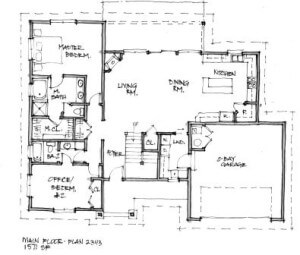To ensure success in any construction project, some simple but critical steps must be taken.
- Develop a Budget:
- Develop a Plan:
- Develop a Schedule:
- Understand Your Expectations:
- Understand Your Limitations:
- Step Out:
- Be Flexible:
Develop a Budget: The first and perhaps the hardest thing for a Client to do is develop, or openly admit to having a budget. Without a budget, however, a Contractor will often spend valuable time chasing down items and developing his proposal around a budget that is not what the Client wants to spend. Why not just be transparent? A Clients job in the whole arrangement is to decide specifically what they want, what quality level they want, and what they want to spend for it. For some reason, Clients believe that if they disclose what they are comfortable spending on their project, that the Contractor will somehow “magically” or conveniently arrive at just that very number. Perhaps with a dishonest Contractor, that might be the case, but you should have other avenues and clues to depend on to judge whether the Contractor is honest or not.
In the end, the Client will probably be the one to suffer from this approach. Consider the following scenario and the frustration to a Contractor who spends the time (sometimes several weeks for your “free” estimate) on details to get the estimate right: A Contractor with integrity will listen to the customer and try to include every conceivable detail and quality of finish he hears the customer asking for, and will arrive at a higher price than a less honest Contractor who wants to win the job based on price, but is waiting to charge extra for items purposefully left out of the initial bid. Only a detailed plan with specifications keeps all Contractor estimates or bids fair: apples to apples; by quoting the same items with the same quality level and scope of work.
Develop a Plan: The second and probably the most important step is to develop a Plan. While it may be tempting to ask a Contractor what a project should cost, getting an accurate answer depends on many factors. Don’t expect an accurate price based on a few pen strokes on a napkin. You must decide to invest in developing a plan. Without a plan, a Contractor, and for that matter, all his tradespeople have no choice but to estimate wide of the mark, if nothing more than to protect themselves from unknowns and contingencies. Without developed plans and specifications, the Contractor is being asked to supply a price based on a guess.
Is there a better way? Yes, there is. A more useful approach is for the Contractor to become a resource and consultant in helping the Client “value engineer” the various available choices and costs, and by trading off between available options, to ultimately tailor the plan and specifications so that they arrive at the Clients budget figure while delivering on the Clients goals. This is a highly satisfactory result and delivers true value because you are partnering and getting the experience of the builder.
A Contractor who uses a transparent two-way process such as this to present available options and their cost cannot simply “invent” a price. No good contractor wants to invest the huge amounts of time necessary to deliver an honest bid, just to see the Client go with a builder presenting a quick from-the-hip dishonest bid. It happens all the time.
The plans and specifications are what a Contractor and his preferred sub-contractors estimate or bid from, and they need details. Many clients simply do not understand the painstaking process a Contractor must use to present an accurate estimate or bid. After all, you will expect him to build the project for the price he presents to you, right?
A good Contractor has a close relationship to an Architect and other specialty designers, and he will lead a collaborative team process to listen to the needs of the Client and design something that can be built within their budget.
Develop a Schedule: Be realistic. If you contact a Contractor and expect your construction project to be done two weeks or a month or two from the first phone call, you are probably being unrealistic unless it is a very small job. It is important to understand how long a project is going to take, and what the impacts will be once you decide to jump in. A good Contractor will help anticipate these impacts, and do what he can to lessen them for the Client. Ordering and staging materials on-site ahead of time, and taking deliveries of critical equipment prior to tearing out a portion of a house can help avoid “show stoppers”.
Understand Your Expectations: Knowing what you expect is an important aspect of any project, and certainly important if you want to produce a good result. However, do you have realistic expectations? In straightforward language…do you know what you are getting into? Some Clients may have no prior experience with a construction project, which is fine but are maybe not aware of the process, and what some of the challenges can be. Construction, especially remodeling, sometimes can resemble a chaotic symphony. At times things are slow, smooth and melodious, then all of a sudden there can be a spike and a push of frenetic energy, and just as suddenly, a rest…and all is quiet.
If you are expecting an experience with no drama, then you are probably not going to like the building experience. If, however, you don’t mind a little excitement mixed with a dose of mild but temporary aggravation here and there, you are in for a special experience.
Knowing your tolerance level for dealing with disruptions, and physically or mentally preparing for the road ahead is an important preparation. Eating out in restaurants three meals a day for a month for a family of four while remodeling can have a financial as well as emotional wear and tear. Missing an important Holiday because the house is under construction or trying to live in a dusty construction zone has tested many marriages.
Understand Your Limitations: It seems like there are dozens of television shows that show people doing work themselves. The biggest problem I see is they make it look too easy. If you are considering DIY, realize that you will probably not have the tools, time, patience, or skills to pull off a professional level job. After your fiftieth run to the home improvement store, you will wonder if you are saving anything at all by doing work yourself.
If you have considered perhaps doing some work yourself on your home, understand what you are truly capable of. While it may seem at first like a great way to save money, in many cases it may not be and could end up costing you much more. The process of construction coordinates many trades that sometimes work with each other to accomplish a result, and everyone depends on the other to know “when what and where” to do their job. This can mean that one trade is dependent on the other to advance in a timely manner to the next step of completion. Anything that is done incorrectly by anyone in the progression and everything breaks down. Someone has to go backward and fix something.
If a homeowner is not available to do their work in a professional manner, speed, and quality, then that particular tradesman, as well as the whole job schedule and sequencing can be disrupted and in jeopardy. Often times, a Contractor will be forced to step in and contract a tradesman to take over the work the homeowner was anticipating doing themselves in order to preserve the sanity and schedule of the subcontractors. This is seldom a good thing for anyone and ends up costing more than if it had been arranged this way from the beginning.
Have a Life: So you have your design, your budget, your Contractor, your schedule…now what? Step out! Have a life! Most of your worries are being carried by the Contractor, so you can enjoy yourself. GO to dinner, go fishing, do what you have waited to do with some time off. Call and say “Hi” to your Contractor every other day if that makes you feel better. If he has a problem or a question, he will call you. No worries. Once in a while drop by the job and see how things are progressing. Better yet, if you live out of the area or just want to save some gas and time, log in. If your contractor has built a website for you, check in and see the progress photos and look at the schedule. All those plans and specifications you worked hard in the beginning with your Contractor to develop are now working and are guiding the job.
Be Flexible: No matter what your expectations, your preparations, or your opinions, try to be flexible. Construction is an adventure that can be exhilarating, challenging, and sometimes exhausting, but if you stay flexible, your Contractor can handle almost anything for you. A good Contractor is on your side, and like a good horse would run himself to death to serve his Client.
A good Contractor is someone who has chosen to work with good tradespeople who share his standards of care and craftsmanship, is a good communicator, and is always anticipating issues and trying to handle them before they become a problem. Sometimes issues do become problems (more so with remodels by their nature) but with a little flexibility, creativity and good tradespeople who care, they always get worked out. No sweat.



Leave a Reply